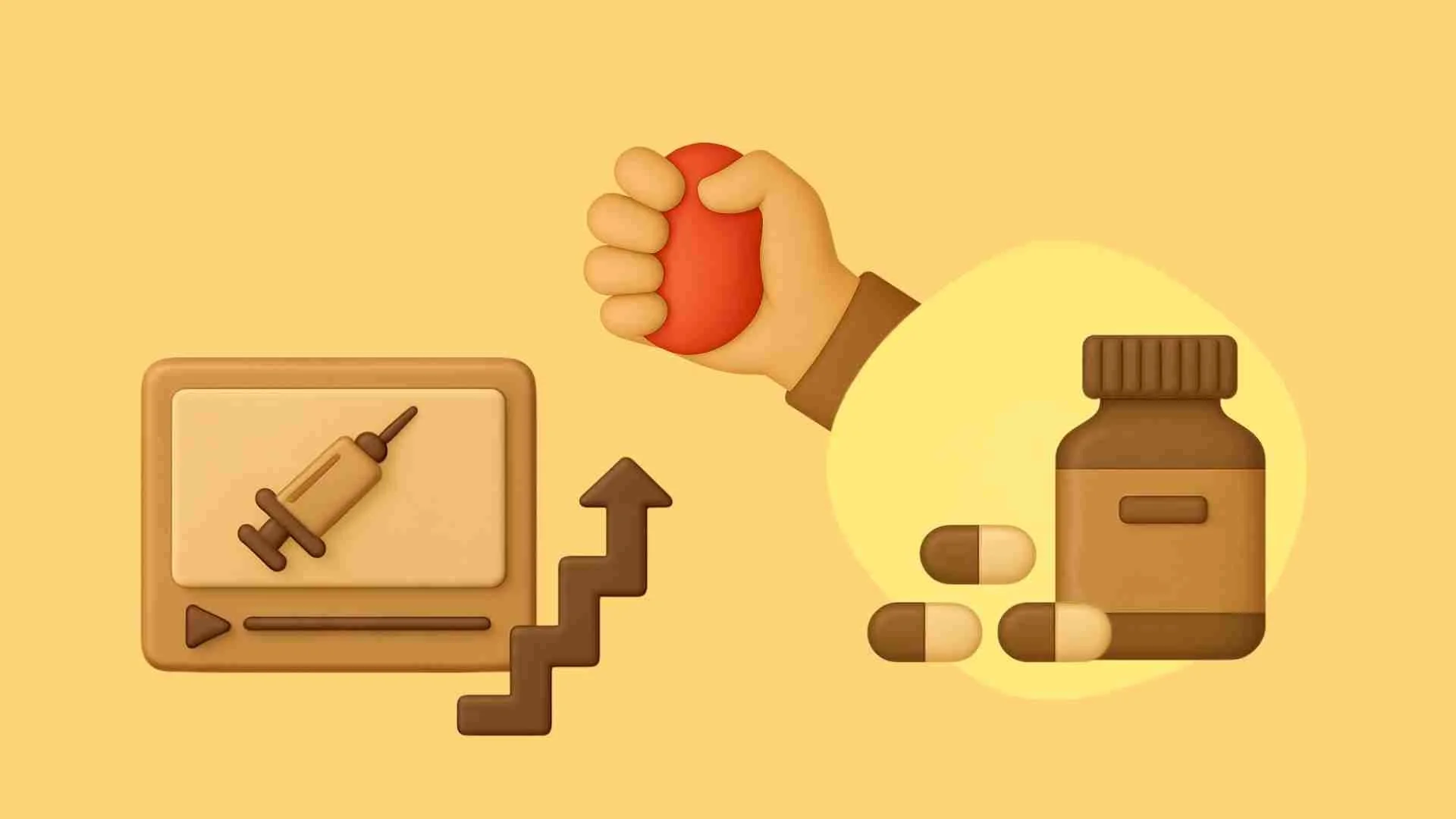Needle phobia & weight loss
Practical help if you have a fear of needles, plus tablet-only routes to a healthier weight.
What is fear of needles?
“Fear of needles phobia” (the medical name is trypanophobia) is a strong anxiety or faint feeling when you see a needle or think about an injection.
Large surveys show that roughly one in four people in the UK score high for needle-related fear, so you’re far from alone.¹
Why needle phobia matters for weight management?
If needles make you freeze or feel faint, you might skip taking the injectable weight loss medicines your doctor suggests. Skipping a dose can slow down progress. Tablet treatments offer a needle-free solution, letting you move forward with weight control while keeping your anxiety in check.8 ways to calm needle anxiety
-

Box breathing
Break in for four-seconds, hold, exhale, hold, repeat. This cycle calms nerves and controls breathing.
-

Muscle tensing
Squeeze your leg and arm muscles for a few seconds to keep blood pressure up, preventing fainting.
-

Look away and listen
Play your favourite song or podcast, then pop in headphones and focus fully on the sound to distract your brain.
-

Step-by-step exposure
Start by looking at photos of needles, then try short videos, and finally hold a real syringe once you feel ready.
-

Talking therapy
A counsellor can use cognitive behavioural techniques to reframe thoughts and build needle confidence.
-

Numbing cream
Apply numbing cream 30-60 minutes before the jab to dull the skin, lower pain signals and help you feel more in control.
-

Bring a supporter
Ask a family member or friend to come with you so they can talk, hold your hand and help you stay calm.
-

Hold a stress ball
Squeezing a ball or someone’s hand gives your brain a physical task and pulls focus away from the needle
Injection-free weight loss options
Approved fat-blocking tablets
One oral medicine already on the NHS stops part of the fat you eat from being absorbed by your gut. Find out how it’s used and what to expect in our orlistat guide.Hormone-style pills in research
Scientists are testing daily pills that copy gut hormones to lower hunger. Read the basics about rybelsus and follow a key study on orforglipron.Fear of needles FAQs
What causes needle phobia?
Needle phobia often starts after a painful jab, fainting episode or even watching someone else panic. Genes, past medical trauma and the body’s “vasovagal” reflex (a sudden drop in blood pressure when you see blood) can all add to the fear.
What is a needle phobia called?
Health professionals call it blood-injection-injury (BII) phobia or trypanophobia. Both names describe an intense fear of needles, blood or medical procedures.
How to get over needle phobia
The gold-standard treatment is graded exposure² (looking at photos, then videos, then a real syringe) combined with cognitive behavioural therapy (CBT). Most people improve after a short course of sessions.
How to cope with needle phobia
Here are some simple, proven ways to cope:
Breathe slowly using box breathing (in for 4, hold, out for 4, hold).
Tense your muscles to keep blood pressure steady and prevent fainting.
Distract yourself with music, a podcast or conversation.
Ask for numbing cream or a smaller needle.
Bring a supporter - a friend or nurse who can talk you through it.
Over time, many people find these steps make medical appointments less stressful.
How to help someone with a needle phobia
If someone you know is scared of needles, here’s how you can support them:
Stay calm - your tone and body language matter more than you think.
Let them lead - ask what helps: talking, silence, hand-holding, distraction.
Use humour or focus tricks - playing a game or naming songs can shift attention.
Be patient - don’t rush or minimise their fear.
Help them prepare - offer to book the appointment or remind them about coping tools.
Sometimes, just knowing they’re not doing it alone makes all the difference.
Is needle phobia a medical condition?
Yes. Blood-injection-injury (BII) phobia is listed as a specific phobia in medical manuals (DSM-5, ICD-10). That means the NHS recognises it as a treatable mental-health condition - it’s not “just nerves.” If it affects your health or daily life, it’s worth speaking to a GP or therapist. It’s treatable with the right support and techniques.
Can breathing techniques stop fainting?
They can help a lot. Fainting during injections often happens because your blood pressure drops too quickly. Box breathing (inhale 4 seconds, hold, exhale 4 seconds, hold) keeps your oxygen steady and mind calm. You may want to try pairing it with applied tension - squeezing your leg and arm muscles - to keep your blood pressure from crashing. Many people find they stay alert and feel more in control this way.
Are there tablets that avoid injections for weight loss?
Yes, some weight loss treatments come in tablet form rather than injections. One is already available through the NHS³, and others are in research trials that show promising results. These tablets work in different ways - some reduce fat absorption, while others copy hormones that control hunger. You can learn more about these in our educational guides on orlistat, rybelsus, and orforglipron.
Will the NHS treat needle phobia?
Yes. If fear of needles is affecting your health or daily life, your GP can help. They may refer you to IAPT (Improving Access to Psychological Therapies) for free CBT, or suggest exposure therapy and coping tools. In more severe cases, specialist anxiety clinics or psychologists may get involved. The help is there - you just need to ask.
Medically reviewed by Dr Jackir Hussain
This page was last medically reviewed by Dr Jackir Hussain on 14 July 2025.
At Pill Scout, we prioritise accurate, evidence-based health information you can trust.
Our medical team regularly reviews and updates our content to ensure it stays aligned with the latest clinical research and guidance.
Dr Jackir Hussain, MBChB, MRCGP
GMC: 7074207
Dr Jackir Hussain is a UK-based GP with over 14 years of clinical experience since earning his medical degree from the University of Manchester. He has worked across diverse healthcare environments, including NHS GP surgeries, urgent care services, homeless shelters, and telemedicine platforms.
His areas of interest include general practice, weight loss, and the use of digital health to improve patient access to care.
Sources
¹ Based on a 2021 Oxford study of 15,014 UK adults (26% screened positive for blood-injection-injury phobia).² Guys and St Thomas’ NHS Foundation Trust. Needle phobia and blood tests - Patient information leaflet. Last reviewed May 2024.
³ NHS. Obesity treatment. Updated February 2023.
Sign up for trusted updates
Be the first to hear when new weight loss tablets are reviewed by UK regulators.


